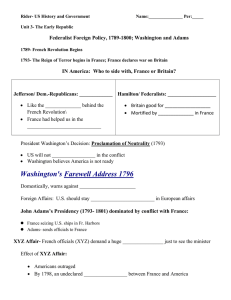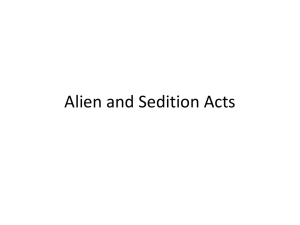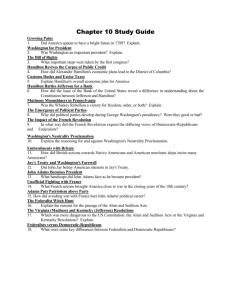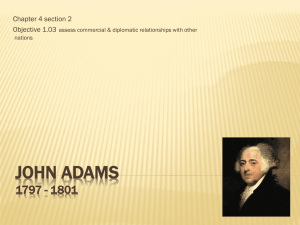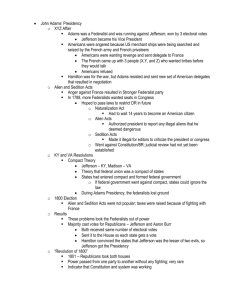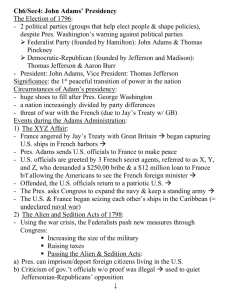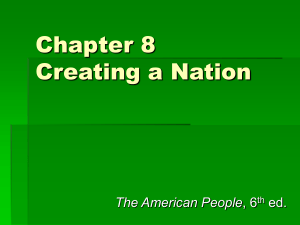Federalists vs. Democratic
advertisement
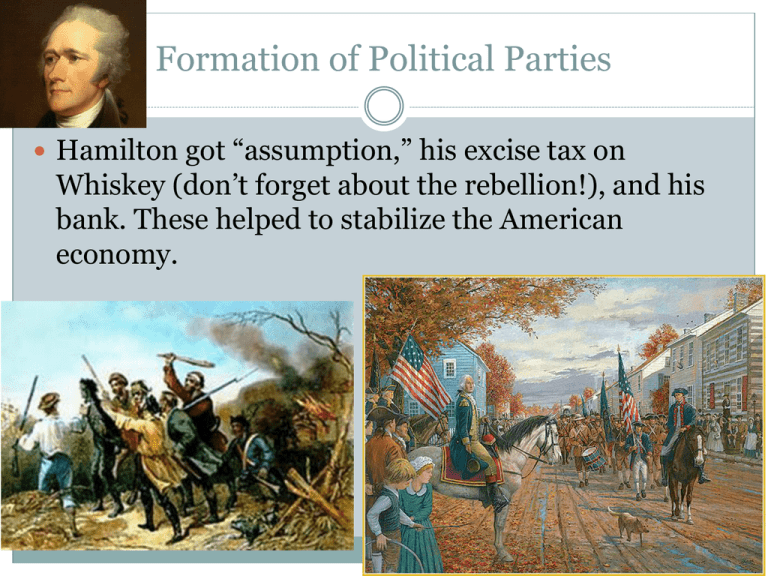
Formation of Political Parties Hamilton got “assumption,” his excise tax on Whiskey (don’t forget about the rebellion!), and his bank. These helped to stabilize the American economy. Formation of Political Parties These things also encroached on states’ rights. The feud between Hamilton and Jefferson led to the formation of two political parties! Federalists vs. Democratic-Republicans. Neutrality Proclamation of 1793 The French Revolution broke out in 1789, eventually drawing much of Europe into war. Jeffersonians supported helping the French, but many Federalists (including Hamilton) felt that war must be avoided at all costs. Despite popular public opinion, Washington chose to stay out of the war. Jay Treaty As war between France and Britain raged, tensions flared along the Canadian border and in the Caribbean. To avoid war, Washington sent John Jay to England to negotiate for peace. Jay Treaty The British agreed to back off, but the U.S. had to pay off pre- Revolutionary War debts. The American public was furious. Jeffersonian mobs burned Jay in effigy. John Adams becomes 2nd President Washington decided to step down at the end of his second term. John Adams becomes 2nd President John Adams (Federalist) defeated Thomas Jefferson (Democratic-Republican) Narrow margin (71 to 68 Electoral College votes). Jefferson became Vice President. Hostilities with France The Jay Treaty had infuriated France French warships began seizing American merchant vessels (around 300 by 1797). The French refused to receive diplomats from the U.S. XYZ Affair Adams negotiated and France agreed to receive three diplomats. When they arrived in Paris, they were met by three go-betweens referred to as ‘X’, ‘Y’, and ‘Z’ They demanded a bribe of $250,000 just to allow the Americans to speak with France’s foreign minister (Talleyrand) XYZ Affair leads to “Quasi-War” War fever gripped America. Adams expanded the Navy. From 1798- 1800, France and the United States fought an undeclared war at sea. Tallyrand finally changed his mind and agreed to talk. Peace was negotiated in the Convention of 1800. John Adams 2nd President Federalist • Alien Act • Sedition Act Our infant Republic is fragile! Our enemies, blinded by jealousy, wish us only harm. We must protect ourselves from the voice of those would damage this seedling institution. Alien and Sedition Acts Extremely unpopular and constantly criticized, Adams and the Federalists pushed through a series of oppressive laws aimed at minimizing Jeffersonian foes. Aristocratic Federalists looked down on immigrants, who tended to support the Democratic-Republicans The Alien Acts raised residence requirements for citizenship from 5 years to 14 years. Also gave power to the president to deport or imprison “dangerous foreigners” in times of crisis. Alien and Sedition Acts Sedition Act undermined the First Amendment (specifically freedom of speech and freedom of the press) Anyone impeding the policies of the government or falsely defaming its officials were now subject to a heavy fine and imprisonment. Ten Jeffersonian newspaper editors were tried and convicted under the Sedition Act Compacts & States Rights & Nullification… Oh My! James “Freedom” Madison Bring it, Adams! Thomas “Liberty” Jefferson The only good Federalist is a dethroned Federalist! The Virginia & Kentucky Resolutions Kentuck y Virginia Virginia and Kentucky Resolutions In response to the Alien and Sedition Acts, Jefferson and Madison penned resolutions that were passed by Kentucky and Virginia in 1798. “Compact Theory” – States had entered into a compact (i.e. contract) with Federal Government. Federal Government was thus the creation of the States. Because water can rise no higher than its source, the states were the final judge of whether the Federal Government oversteps its authority. States have the right of “nullification” – i.e. refusal to accept unjustified Federal laws. States could nullify laws within their borders. No other states endorsed the Virginia and Kentucky Resolutions, but they provided a strong argument for States’ Rights (an issue that would continue to be debated until the Civil War) A New President John Adams ran for a second term in 1800 against Jefferson Adams was the champion of a strong central government, while Jefferson was the champion of agrarian purity, liberty, and states’ rights. Jefferson won 73 to 65. The Federalist party faded away following Adams’ defeat QUIZ! TIME TO ROLL THE DICE!!! Letters to the Editor Federalists: write a letter to the editor of your local newspaper arguing in support of the Alien and Sedition Acts Democratic-Republicans: write a letter to the editor of your local newspaper arguing against the Alien and Sedition Acts Be sure to explain your position! (i.e. why are the laws good or bad for the country, based on your point of view)
